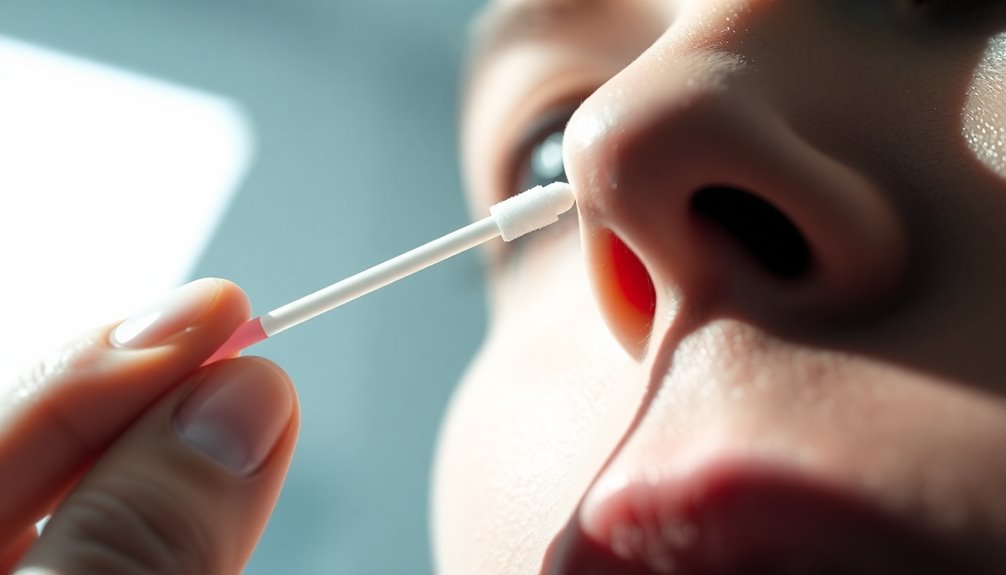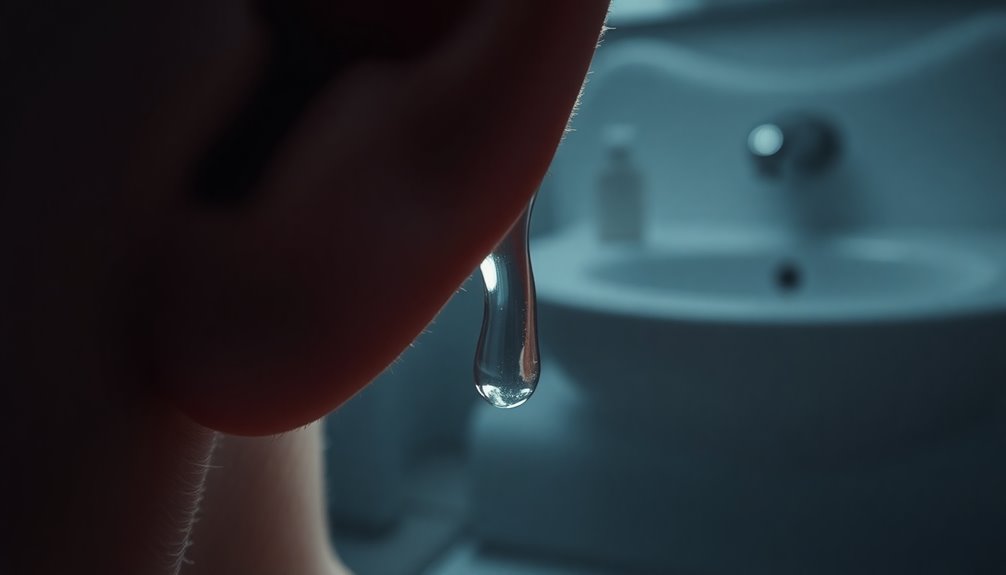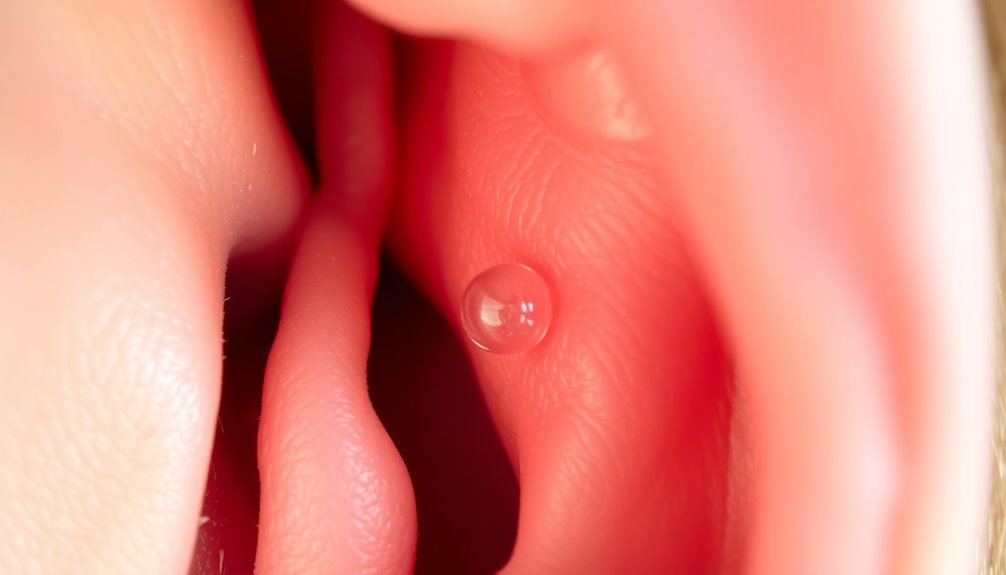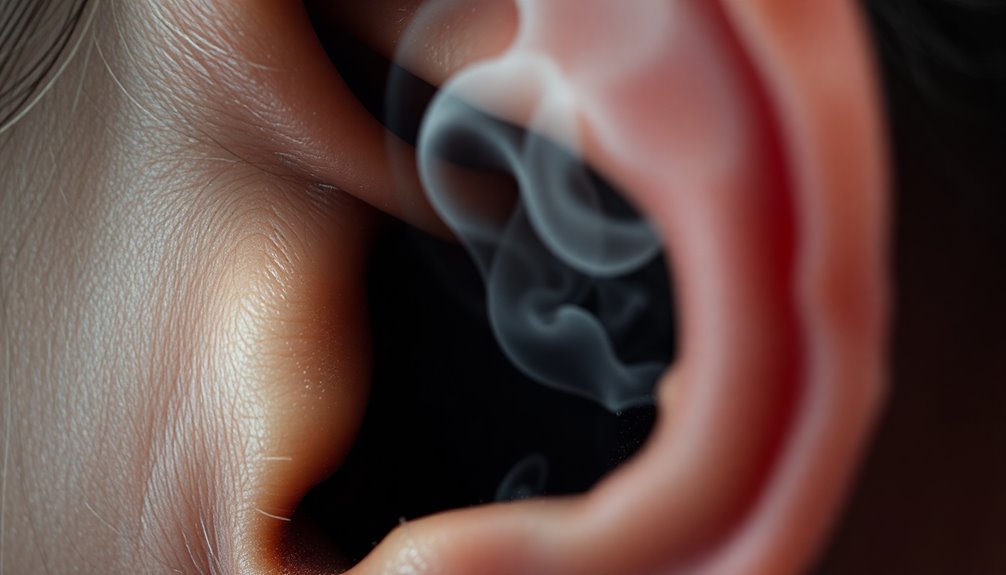If your ear wax stinks, it might be a sign of underlying issues that need attention. Smelly ear wax can result from bacteria, ear infections, or even skin conditions like eczema. Certain foods, like garlic and spicy dishes, can also worsen the odor. You might notice discomfort or hearing difficulties accompanying the smell, hinting at potential blockages. It's crucial to maintain proper ear hygiene and consult a healthcare provider if the odor persists. Ignoring these symptoms could lead to further complications, but understanding the causes could help you tackle the problem effectively and improve your ear health.
Key Takeaways
- Foul-smelling earwax may indicate trapped debris or bacteria due to wax buildup or foreign objects in the ear canal.
- Ear infections, such as swimmer's ear, can create environments for microbial growth, leading to unpleasant odors.
- Skin conditions like eczema can alter earwax composition, resulting in a stronger, unpleasant smell.
- Diet, particularly strong aromatic foods like garlic, can influence the odor of earwax.
- Persistent foul odor, along with symptoms like pain or hearing difficulties, may signal an underlying issue needing medical attention.
Understanding Ear Wax Composition
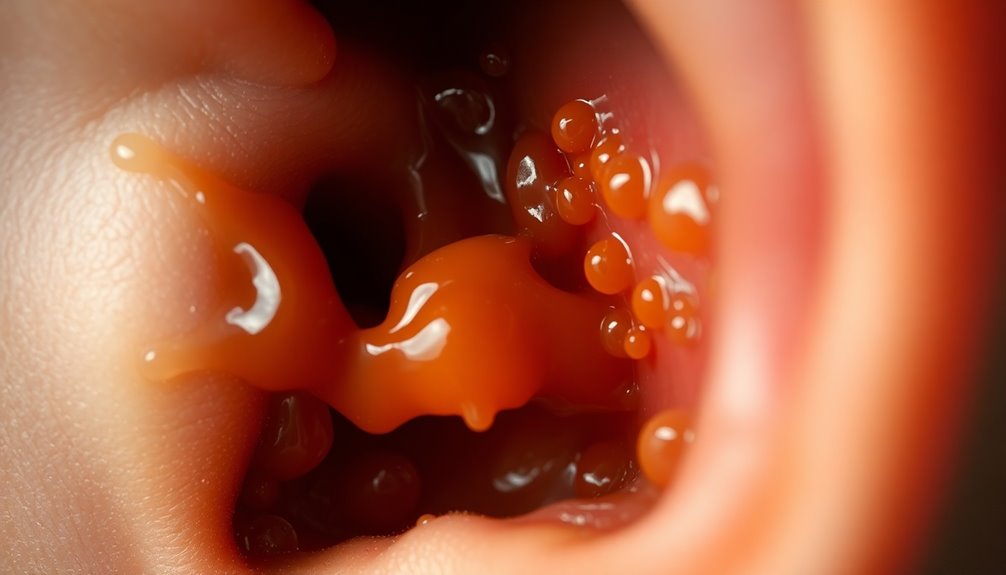
When you think about ear wax, or cerumen, it's vital to understand what it's made of. The composition of earwax isn't just a random mix; it's primarily composed of dead skin cells, secretions from sebaceous and ceruminous glands, and hair.
This unique blend serves as a natural barrier in your ear canal. The fatty acids, cholesterol, and alcohols in earwax contribute to its protective and lubricating properties, making it essential for your ear health.
Earwax typically has a slightly acidic pH level between 6.0 and 7.0, which helps inhibit the growth of bacteria and fungi, reducing the risk of infections.
Depending on genetic factors, you might notice that earwax can vary in texture; it can be dry and crumbly or wet and sticky. Regardless of its form, earwax plays a significant role in maintaining your ear health by trapping dirt and dust, preventing infections, and aiding the self-cleaning process of your ear canal.
Causes of Smelly Ear Wax
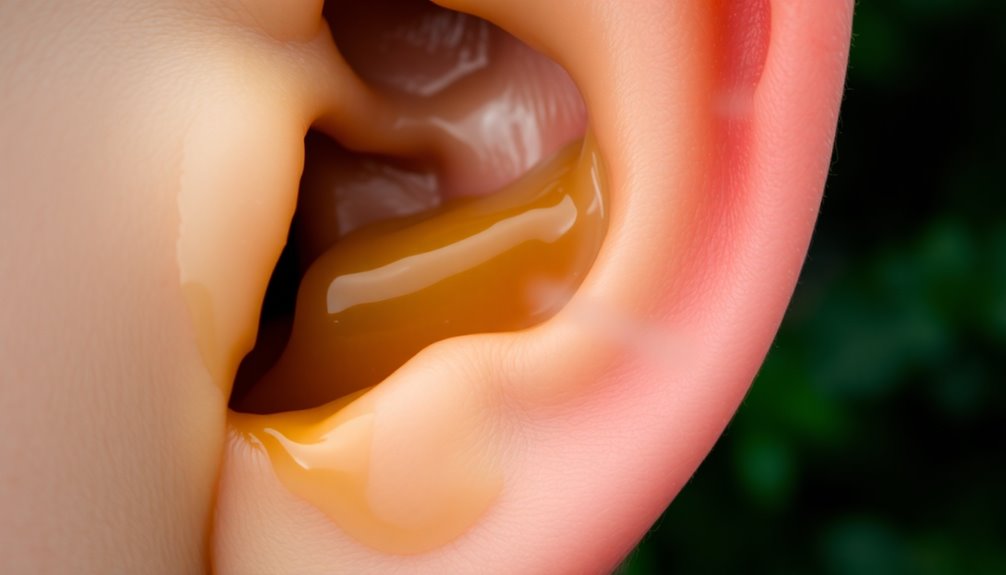
Smelly ear wax can often signal underlying issues that need attention. One common cause of smelly earwax is earwax buildup, which can occur when foreign objects block the ear canal. This blockage traps debris and bacteria, leading to unpleasant odors.
Additionally, ear infections, whether bacterial or viral, can create an environment for microbial growth, especially in conditions like swimmer's ear, where trapped moisture promotes these infections.
Certain skin conditions, such as eczema, can also alter the composition of your ear wax. This change might indicate inflammation or infection, resulting in a stronger, foul smell.
Furthermore, your diet can play a role; consuming foods like garlic or spicy dishes may influence the odor of your earwax, but it's important to recognize that more serious health concerns usually underlie these smells.
If you notice a strong, unpleasant odor coming from your ear wax, it's imperative to seek medical evaluation. A severe infection may be at play, and identifying the underlying cause is crucial to prevent complications and restore your ear health.
Don't ignore these signs; they may indicate something that needs prompt attention.
Symptoms of Foul-Smelling Wax

If you notice a foul odor coming from your earwax, it could signal an underlying issue that needs attention.
You might also experience earache, discomfort, or even trouble hearing, which aren't just common problems but signs of potential infection.
Pay close attention to these symptoms; they're your body's way of urging you to seek help.
Earache and Discomfort
A persistent earache often signals the presence of foul-smelling earwax, which can cause sharp pain or a continuous dull ache in your ear canal.
You might also notice smelly discharge draining from your ear, a sign of an underlying infection. This infection can lead to further discomfort, including fever and increased irritation.
As earwax buildup accumulates, it can block sound transmission, making it difficult for you to hear properly.
You may feel a sensation of fullness in your ear, which can be quite bothersome. The irritation from the smelly earwax can cause redness and swelling in your ear canal, intensifying your discomfort.
If you or your child is tugging at their ear, crying more than usual, or appearing unusually irritable, these behaviors can indicate ear problems that need medical attention.
Recognizing these symptoms early is essential in addressing any potential infections and preventing further complications. Staying alert to the signs of earache and discomfort can help you seek timely treatment, improving your overall ear health and comfort.
Unpleasant Odor Characteristics
Foul-smelling earwax can be an alarming symptom that hints at underlying issues, such as bacterial or fungal infections. When you notice a persistent foul odor emanating from your ears, it's vital to pay attention. Smelly earwax often indicates that something's not right, and it may require a medical evaluation.
You might also experience other uncomfortable symptoms alongside that unpleasant smell. Earaches, difficulty hearing, and drainage can accompany smelly earwax, alerting you to the presence of bacteria or fungal infections.
If you have children, be on the lookout for signs of irritation, like tugging at their ears or increased crying. These behaviors can indicate underlying issues that need to be addressed promptly.
Moreover, the impact of malodorous earwax can extend beyond physical discomfort. It can greatly affect your social interactions and self-esteem, making you feel self-conscious about the odor.
Changes in the smell of earwax can signal changes in your hygiene practices or more serious health concerns. In any case, seeking professional assessment is essential for proper treatment and to eliminate that foul odor for good.
Hearing Impairment Signals
Persistent foul-smelling earwax can lead to hearing impairment, signaling potential blockages in the ear canal. When you encounter smelly earwax, it's important to recognize the signs of possible hearing loss or other medical conditions.
Here are four symptoms to watch for:
- Persistent Odor: If your earwax has a strong, unpleasant smell, it may indicate an ear infection or impacted earwax.
- Hearing Difficulties: You might experience muffled sounds or a feeling of fullness in your ear, which could signal blockage affecting your hearing.
- Ear Discomfort: Pain or discomfort in the ear can accompany smelly earwax, often linked to infections or excessive wax buildup.
- Additional Symptoms: Dizziness or balance issues should never be ignored, as they could indicate a more severe medical condition.
If you're experiencing these symptoms alongside foul-smelling earwax, it's vital to seek medical evaluation. Ignoring these signs can lead to more severe complications, including chronic ear infections and worsening hearing loss.
Taking action can help maintain your ear health and overall well-being.
Diagnosis of Ear Wax Issues
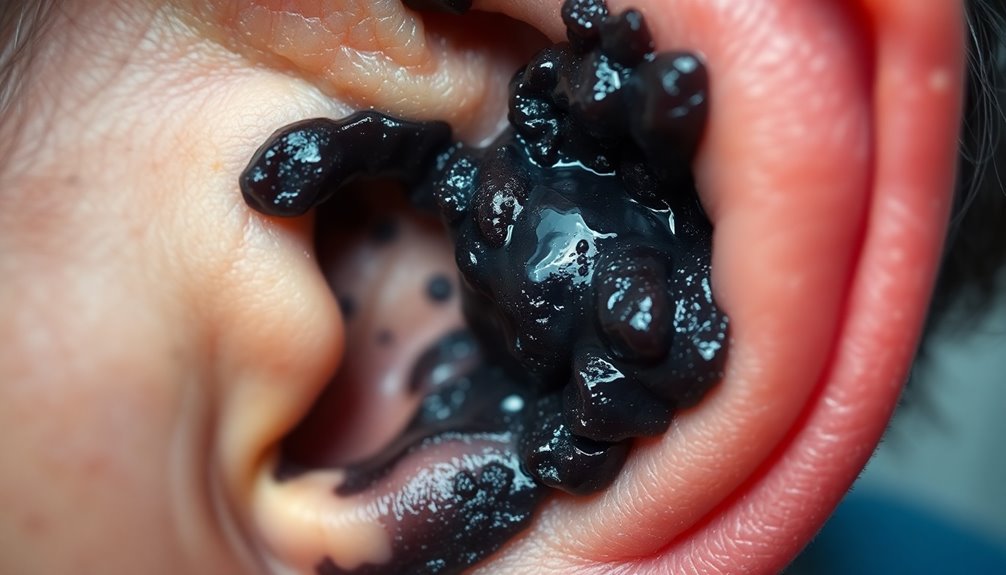
When you suspect ear wax issues, a physical examination is often your first step.
Your doctor may use otoscopy to check for buildup or infections, and they might take cultures if there's discharge to identify any bacteria or fungi.
If you're experiencing hearing difficulties, an audiological assessment could be necessary to guarantee a complete diagnosis.
Physical Examination Techniques
Proper diagnosis of ear wax issues often hinges on thorough physical examination techniques. As a patient, you can expect a healthcare professional to employ several methods to assess your ear health. Here's what typically happens during your visit:
- Otoscopy: The provider uses a lighted instrument to inspect your ear canal for wax buildup or signs of infection. This visual assessment is essential for effective earwax removal.
- Assessment of Earwax: Your healthcare professional will evaluate the consistency, color, and odor of your earwax. These factors can reveal potential health issues that need addressing.
- Patient History: Expect to discuss your hygiene practices and any accompanying symptoms. This information is significant for diagnosing earwax-related issues and tailoring appropriate treatment.
- Audiological Assessments: If you're experiencing hearing difficulties, the provider might conduct hearing tests to determine if earwax blockage is the cause.
These examination techniques help guarantee that any earwax problems are diagnosed accurately and managed effectively, keeping your ear canal healthy and odor-free.
Bacterial Culture Testing
Bacterial culture testing is a valuable diagnostic tool for identifying the underlying causes of ear wax issues, especially when you're dealing with an unpleasant odor. This test involves collecting samples of earwax or discharge from your ear canal to pinpoint specific bacteria or fungi that may be responsible for the earwax smell and any underlying infection you might have.
When you visit a healthcare provider, they'll typically use a sterile swab to gather a sample, which is then placed in a growth medium. This allows any bacteria or fungi present to multiply for analysis. The results, which usually take several days, provide essential information about the pathogens involved and their sensitivity to antibiotics, helping to guide effective treatment.
Bacterial culture testing is particularly beneficial if you're experiencing persistent earwax odor alongside symptoms like pain, drainage, or hearing loss.
Audiological Assessment Needs
Audiological assessments play an essential role in diagnosing earwax issues, especially if you're experiencing symptoms like hearing loss or discomfort. These evaluations help pinpoint the extent of earwax blockage and its impact on your hearing abilities.
Here's what to expect during the process:
- Comprehensive Patient History: You'll discuss your hygiene practices, previous ear infections, and any other factors contributing to earwax buildup.
- Physical Examinations: A healthcare professional will perform an otoscopy to visualize earwax accumulation and check for any underlying infections or blockages.
- Pure-Tone Audiometry: This test measures your hearing sensitivity across different frequencies, helping identify any hearing loss related to earwax issues.
- Speech Audiometry and Tympanometry: These assessments evaluate how well you can understand speech and measure the movement of your eardrum, providing further insight into ear function.
Early diagnosis through audiological assessments can lead to timely interventions, preventing complications like chronic infections or further hearing loss.
If any of these symptoms resonate with you, don't hesitate to seek professional help!
Treatment Options for Ear Wax
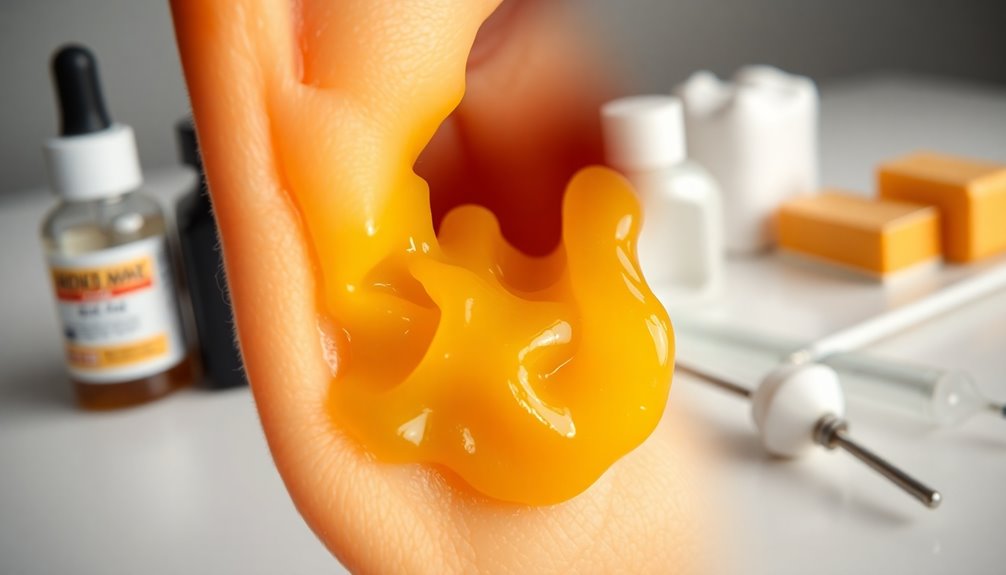
When dealing with ear wax, you have several effective treatment options at your disposal. First, consider over-the-counter ear drops like Debrox. These can soften ear wax, making it easier to expel naturally or flush out during cleaning.
If you're dealing with a smelly ear due to impacted wax, professional ear cleaning methods, such as suction or irrigation, are highly recommended. These methods are safe and effective for removing stubborn wax.
You might also explore home remedies, like warm olive oil. This can help soften ear wax, but be cautious—using it improperly could push wax deeper into your ear canal.
If these ear wax removal techniques at home aren't working or if symptoms persist, it's essential to consult an ENT specialist. They can provide a proper diagnosis and suggest appropriate treatment options tailored to your needs.
Regular evaluations by a healthcare provider can help monitor your ear health and prevent excessive wax buildup, which often leads to infections and unpleasant odors.
Make sure you stay proactive about your ear care to keep those smelly issues at bay!
Prevention of Smelly Ear Wax
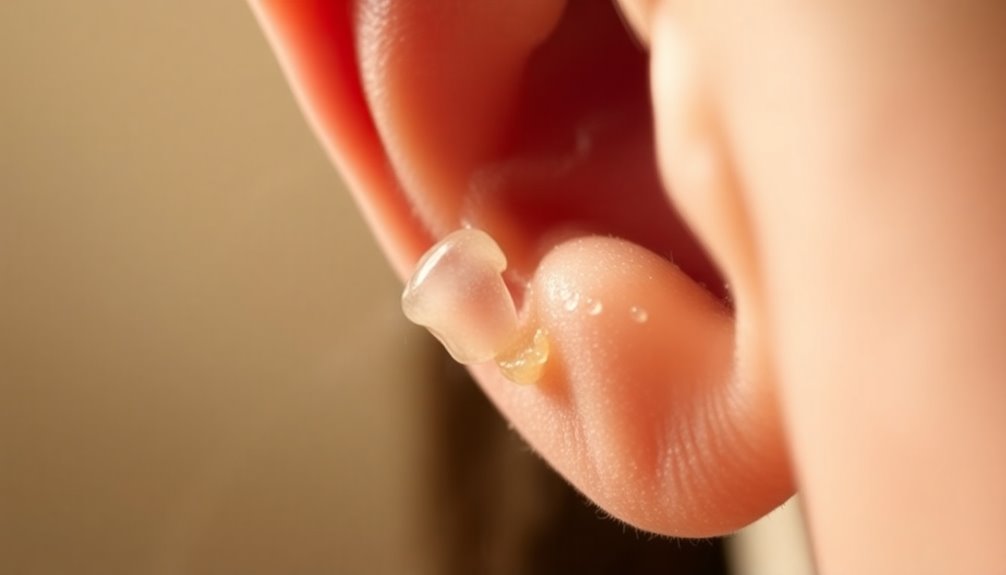
To prevent smelly ear wax, you should maintain regular ear hygiene by gently cleaning your outer ear with a damp cloth.
Staying hydrated also helps produce healthy earwax, which can keep odors at bay.
Maintain Ear Hygiene
Maintaining ear hygiene is essential for preventing smelly earwax and ensuring overall ear health. If you want to keep that unpleasant odor at bay, follow these simple tips:
- Clean Regularly: Use a damp cloth to gently clean your outer ear, removing excess wax and preventing buildup that can lead to odor.
- Avoid Cotton Swabs: Stay away from cotton swabs or other objects in the ear canal. They can push wax deeper, making it harder for your ears to clean themselves naturally.
- Watch Your Diet: Limit odor-inducing foods like garlic and spicy dishes. These can influence how your earwax smells, potentially making it more unpleasant.
- Schedule Check-Ups: Don't forget to visit your healthcare provider for periodic check-ups. They can help monitor your ear health and manage any issues related to excessive wax buildup.
- Regular puppy training can enhance overall pet hygiene and reduce odors associated with ear issues.
Stay Hydrated Regularly
Staying hydrated is vital for preventing smelly ear wax and promoting overall ear health. When you drink enough water, you support your body in maintaining the proper consistency of ear wax, which helps prevent unwanted buildup that can lead to unpleasant odors.
Adequate hydration keeps moisture balanced in the skin and glands of your ears, reducing the production of dry, flaky ear wax that might contribute to foul smells.
By drinking sufficient water, you also aid your body in flushing out toxins, which can minimize the risk of infections that cause smelly ear wax. The recommended daily intake ranges from about 2.7 liters (91 ounces) for women to 3.7 liters (125 ounces) for men. This amount can considerably support your ear hygiene and overall health.
It's important to monitor your hydration levels, especially in dry climates or during physical activity. These factors can alter ear wax characteristics and possibly lead to odor issues.
Impact on Hearing Health
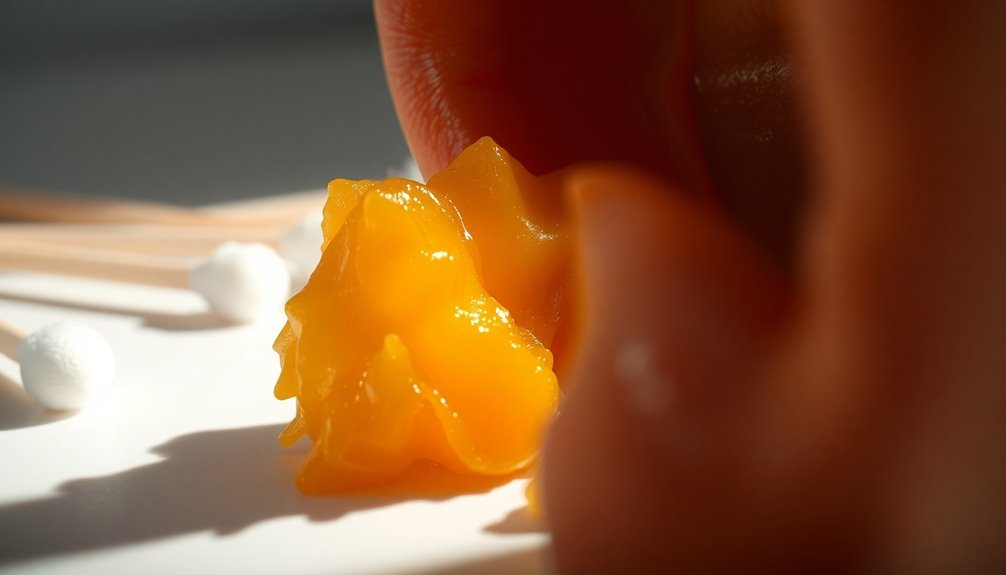
Experiencing issues with earwax can greatly impact your hearing health.
Smelly earwax often signals underlying infections that may lead to inflammation, affecting how well you hear. If you let it go untreated, you might face serious consequences.
Here are four key points to take into account:
- Blocked Sound: Impacted earwax, especially when it smells foul, can obstruct sound transmission, causing temporary hearing loss.
- Chronic Infections: Bad-smelling earwax can indicate chronic ear infections, which may damage the ear structure and lead to permanent hearing impairment.
- Bacterial Growth: Changes in earwax odor can point to bacteria or fungi that complicate existing hearing conditions, making medical evaluation essential.
- Self-Cleaning Failure: Regular earwax removal is vital; excessive buildup can hinder your ear's natural self-cleaning process, worsening your hearing health.
Additionally, untreated earwax issues can contribute to conductive hearing loss, similar to how conditions like otosclerosis affect hearing through physical obstructions.
Dietary Influences on Ear Wax

Diet plays a surprising role in the characteristics of earwax, including its odor. Your dietary habits can influence the scent of earwax, especially if you consume strong aromatic foods like garlic and spices. These foods contain compounds that may make your earwax smell stronger or more unpleasant.
However, a balanced diet rich in vitamins and antioxidants can support overall ear health, potentially leading to more neutral-smelling earwax.
Hydration is another key factor. When you stay well-hydrated, it helps maintain the right consistency of earwax, which can reduce the likelihood of excessive buildup. This, in turn, can help keep any unpleasant smells at bay.
While diet is important, it's worth noting that genetics and environmental influences play a more significant role in earwax production and characteristics than diet alone.
If you're concerned about smelly earwax, reflecting on your dietary choices can be a good start. Consulting a medical professional can provide personalized dietary advice that may further support your ear health and hygiene.
Ultimately, maintaining a balanced diet and proper hydration can promote healthier earwax and reduce odor.
When to Seek Medical Help
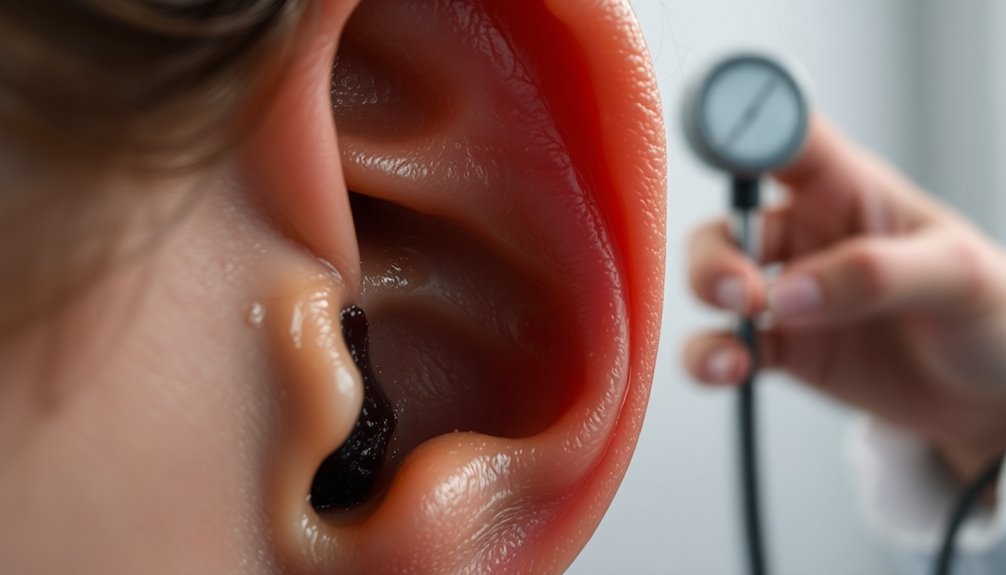
If you notice a strong or unpleasant odor coming from your earwax, it might be time to seek medical help. Smelly earwax can signal an underlying issue, such as an infection.
It's essential to pay attention to any accompanying symptoms that may indicate a need for professional evaluation. Here are some signs that warrant medical advice:
- Persistent odor: If the smell doesn't go away despite proper ear hygiene.
- Pain or discomfort: Any earache or pressure that accompanies the foul smell should be taken seriously.
- Drainage or discharge: If you notice any liquid leaking from your ear along with the odor.
- Difficulty hearing: A noticeable change in your hearing ability could be a sign of an infection or blockage.
If you experience any of these symptoms, consult with a healthcare professional or an ENT specialist for a thorough examination.
Ignoring these signs could lead to complications, so don't hesitate to seek assistance if your earwax becomes consistently smelly or if you feel any discomfort.
Early intervention is key to maintaining ear health.
Myths About Ear Wax
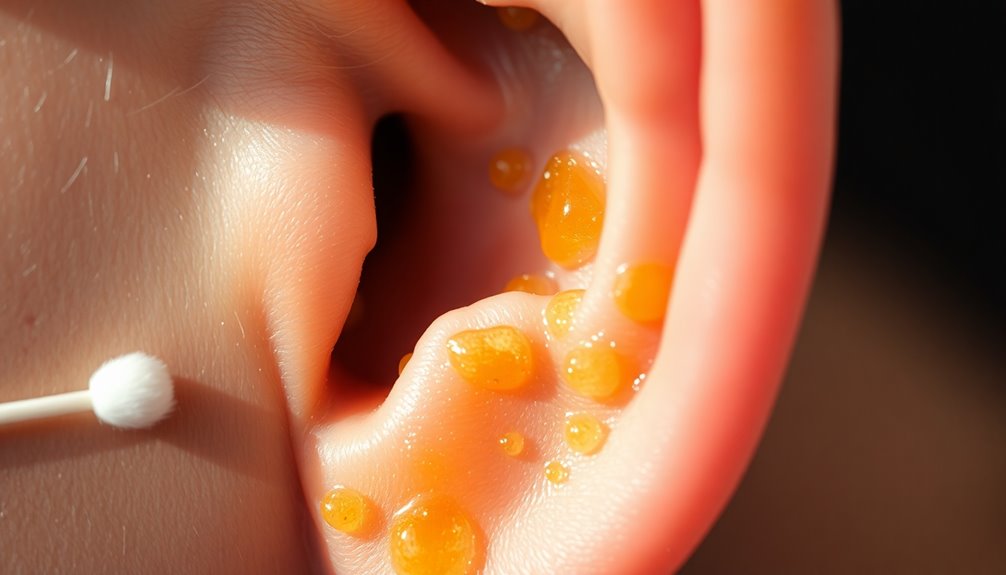
Earwax myths can lead to misunderstandings about its role in ear health. Many people think earwax should be completely removed, but that's a misconception. In reality, earwax is often crucial for lubrication and protection against infections.
The good news is that having some level of earwax is normal and healthy; its absence doesn't necessarily indicate good hygiene. You might believe that cleaning your ears frequently prevents buildup, but over-cleaning can actually cause impaction and irritation.
It's also a common myth that earwax color reflects personal cleanliness; variations in color can occur naturally and don't signify a hygiene issue. Another myth is that earwax problems are exclusive to older individuals. In truth, earwax issues can affect anyone, including children and young adults.
If you notice an unusual smell or suspect a foreign object in your ear, it might be a sign of an underlying issue. Instead of falling for these myths, remember that earwax plays a crucial role in keeping your ears healthy. Embrace it, and only seek help if you experience persistent problems.
Frequently Asked Questions
Why Does My Ear Wax Smell so Bad?
If your ear wax smells bad, it could indicate an underlying issue.
Bacterial or fungal infections often produce foul odors as they thrive in warm, moist environments. Changes in color or consistency can also signal skin conditions or infections.
Certain foods you eat might influence the odor too. If the smell persists, it's important to see a healthcare professional to check for any serious conditions that may require treatment.
Don't ignore it!
What Does Ear Wax Tell You About Your Health?
Did you know that around 30% of people experience earwax-related health issues?
Your earwax can reveal a lot about your health. If it's unusually foul-smelling, you might've an infection or trapped moisture. Changes in color or consistency could indicate conditions like swimmer's ear or skin disorders.
Keeping an eye on your earwax and consulting a healthcare professional can help you catch potential problems early and maintain your overall ear health.
How to Make Your Ears Stop Smelling Bad?
To make your ears stop smelling bad, start by gently cleaning the outer ear with a soft cloth.
You can use over-the-counter ear drops like Debrox to soften earwax, making it easier to remove. Staying hydrated helps maintain healthy earwax consistency, which can reduce odors.
Avoid inserting objects into your ear canal, as this can lead to buildup and infections.
Finally, schedule regular check-ups with your healthcare provider for ideal ear health.
How Do You Flush Out Ear Wax?
You mightn't realize it, but ear wax can really affect your ear health.
To flush it out, start by using over-the-counter ear drops to soften the wax. After a few days, gently irrigate your ear with warm water using a bulb syringe.
Just remember, don't use cotton swabs—they can push wax deeper. If you're still having issues, consider seeing an ENT specialist for professional cleaning.
Your ears deserve the best care!
Conclusion
To sum up, taking care of your ear wax is more important than you might think. Did you know that nearly 60% of people experience ear wax buildup at some point in their lives? This can lead to unpleasant odors and even hearing issues. By understanding the causes and symptoms of smelly ear wax, you can take proactive steps to maintain your ear health. Don't hesitate to seek medical advice if you notice any concerning changes!

